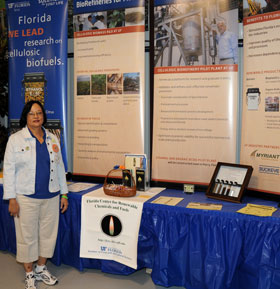 There are exhibits from land grant colleges throughout the southeast at Sunbelt Ag Expo. As a member of the Gator Nation I had to spend some time with the University of Florida.
There are exhibits from land grant colleges throughout the southeast at Sunbelt Ag Expo. As a member of the Gator Nation I had to spend some time with the University of Florida.
One stop in their building was with a display for the Florida Center for Renewable Chemicals & Fuels. On hand to tell their story was Sheilachu P. Gomez, Assistant Director, pictured here. She says the Center is primarily for the development of the technology to convert biomass to ethanol and organic acids. They have two patents that have been purchased by two companies already (an ethanol patent to Verenium and organic acids patent to Myriant). They have a pilot plant for cellulosic ethanol production to optimize biomass conversion at the campus and have a planned plant to be located in Perry, FL. The last is a partnership with Myriant and Buckeye. In the future Sheila says they’re looking more into the value added products of the production process.
You can listen to my interview with Sheila below:


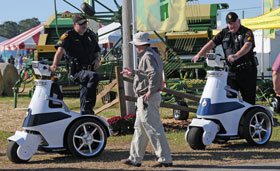 I don’t know how much of a security concern there is at farm shows today like Sunbelt Ag Expo but in Moultrie, GA the police looked like they were on the cutting edge with their unique tricycles.
I don’t know how much of a security concern there is at farm shows today like Sunbelt Ag Expo but in Moultrie, GA the police looked like they were on the cutting edge with their unique tricycles. A nationwide survey conducted for the
A nationwide survey conducted for the 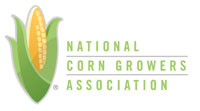 “Farming is under attack in the mainstream media because some reporters seem to have the wrong idea about modern American agriculture,” Ihnen said. “One of our goals at NCGA is to help educate the media and the public about how current technology has helped family farmers do their traditional jobs more efficiently, more effectively and more affordably.”
“Farming is under attack in the mainstream media because some reporters seem to have the wrong idea about modern American agriculture,” Ihnen said. “One of our goals at NCGA is to help educate the media and the public about how current technology has helped family farmers do their traditional jobs more efficiently, more effectively and more affordably.”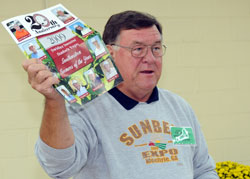 He says he’s been the media director for Sunbelt Ag Expo for 32 years and he’s Mr. Peanut. Actually he’s Tyron Spearman, Spearman Marketing. Tyron also reports for
He says he’s been the media director for Sunbelt Ag Expo for 32 years and he’s Mr. Peanut. Actually he’s Tyron Spearman, Spearman Marketing. Tyron also reports for 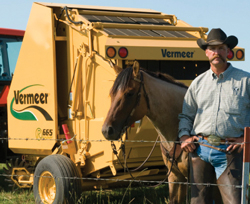 According to Vermeer Forage Marketing Manager Dan Belzer, the new Rancher 665 baler design fills a niche many cow-calf producers have been asking for – basically, the ability to produce bigger bales with a “right-sized” baler that requires less horsepower. “Now, with a minimum 60 hp tractor, every day cow-calf producers can roll up large-diameter bales, which they can easily move around with their medium-sized loaders. Also, because the Rancher 665 baler is ‘right-priced’, it’s very competitive with used late-model balers in the same class, which gives Rancher 665 baler owners the extra peace of mind of having new product warranty.”
According to Vermeer Forage Marketing Manager Dan Belzer, the new Rancher 665 baler design fills a niche many cow-calf producers have been asking for – basically, the ability to produce bigger bales with a “right-sized” baler that requires less horsepower. “Now, with a minimum 60 hp tractor, every day cow-calf producers can roll up large-diameter bales, which they can easily move around with their medium-sized loaders. Also, because the Rancher 665 baler is ‘right-priced’, it’s very competitive with used late-model balers in the same class, which gives Rancher 665 baler owners the extra peace of mind of having new product warranty.”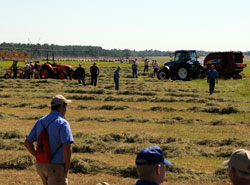 Field demonstrations are in full swing at Sunbelt Ag Expo. I’ve updated the photo album for you and am taking off but have a lot more to post.
Field demonstrations are in full swing at Sunbelt Ag Expo. I’ve updated the photo album for you and am taking off but have a lot more to post. Some classes are now requiring students to read books like
Some classes are now requiring students to read books like 
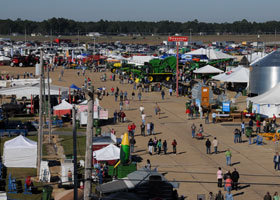 The old water tower on the grounds of the Sunbelt Ag Expo makes a good platform to look out over the show. I climbed it last year for the first time and again this year.
The old water tower on the grounds of the Sunbelt Ag Expo makes a good platform to look out over the show. I climbed it last year for the first time and again this year.